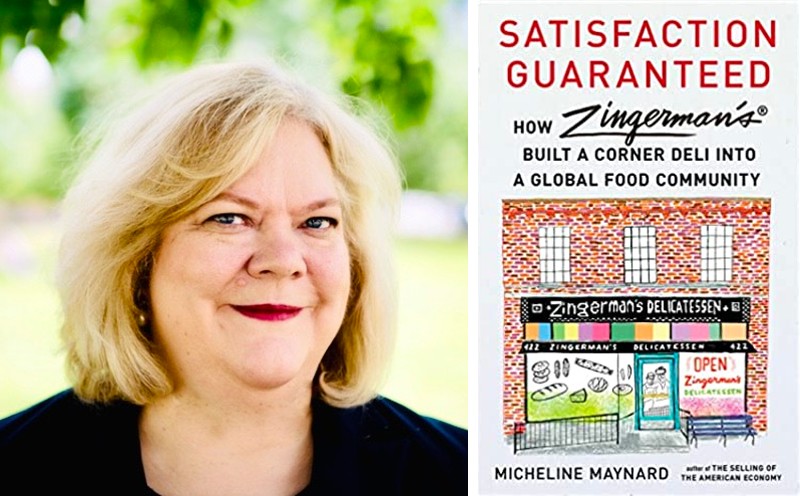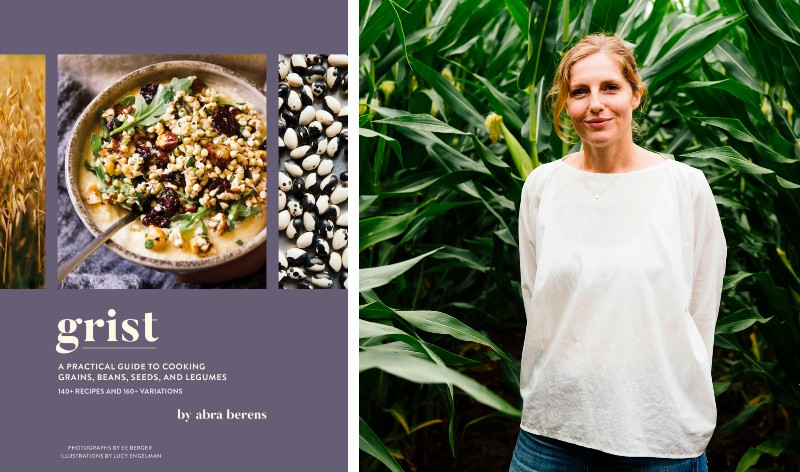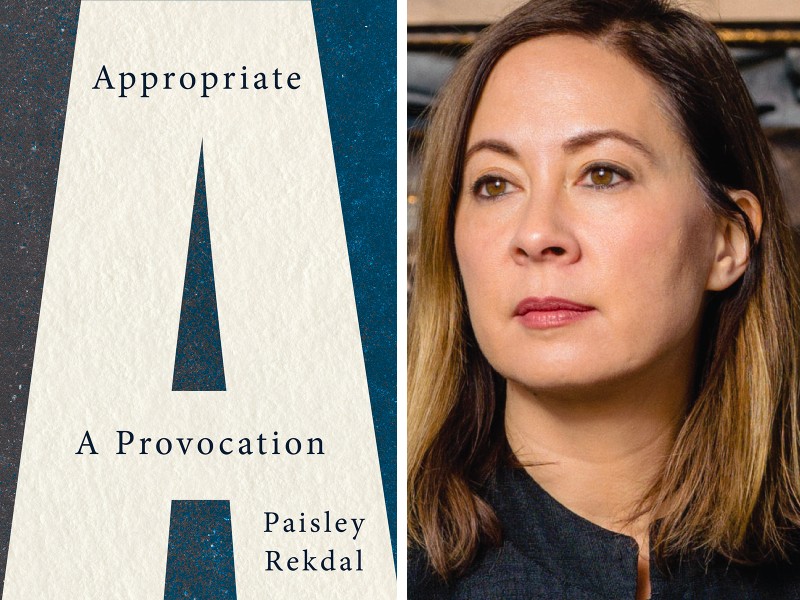On the Ball: The AFC Ann Arbor Soccer Club Thinks Globally, Acts Locally

On January 1, AFC Ann Arbor announced the first signing for its 2022 women's team: Emily Eitzman, a University of Michigan college student who made her debut in 2019 with the semi-pro soccer club as a 17-year-old student at Saline High School.
But Eitzman never stopped working with AFC Ann Arbor despite her two-year playing gap for the team.
And AFC never stopped working for Ann Arbor and the greater Washtenaw community.
On the Corner: A new book about Zingerman’s Deli details the Ann Arbor institution's satisfying history

If you live in Ann Arbor long enough, you will inevitably be asked about three things: University of Michigan football, the Art Fairs, and Zingerman’s Deli.
Since 1982, people have flocked to Zingerman’s for top-of-the-line sandwiches and outstanding customer service. The story of how the business grew from a 1978 idea hatched between restaurant colleagues Ari Weinzweig and Paul Saginaw into a nationally known business is covered in Micheline Maynard's new book, Satisfaction Guaranteed: How Zingerman’s Built a Corner Deli into a Global Food Community.
Maynard is a longtime journalist, educator, and frequent guest on both radio and TV. Her career includes writing as a columnist at The Washington Post, a contributor to The Takeout, Medium, and The Ann Arbor Observer, and as the author of The End of Detroit and The Selling of the American Economy: How Foreign Companies Are Remaking the American Dream.
The genesis for the book began before the COVID pandemic.
Grains, Beans, Seeds, and Legumes: Chef and U-M alum Abra Berens offers recipes and social context for them in her new book, "Grist"

When you start paying closer attention to a food or beverage, you notice more details among different types or brands. Experts who focus on wine or coffee, for example, are able to discuss the nuances and tasting notes of unique varieties.
But those aren’t the only foods and drinks that foodies and cooks can get to know on a deep level.
Abra Berens, a chef, author, former farmer, and U-M alum, brings this level of attention to beans, grains, legumes, and seeds in her new cookbook and guide, Grist. She writes about how her interest in grains took root:
Utah poet laureate and U-M grad Paisley Rekdal considers the implications of cultural appropriation in literature in "Appropriate: A Provocation"

Paisley Rekdal examines cultural appropriation in literature in her new nonfiction book, Appropriate: A Provocation. However, this collection is not essays, as one might expect.
Instead, Appropriate consists of letters addressed to a student who is a new writer, and this structure offers a different, more conversational, and inquisitive tone. This recipient is not based on any specific person but inspired by many students and colleagues. The letters refer to the student as X.
Early on, the first letter defines the subject of cultural appropriation as being about identity. It is also, “an evolving conversation we must have around privilege and aesthetic fashion in literary practice.” Rekdal’s examples of the issue—both positive and negative, including hoaxes in which authors pretend to have another identity—demonstrate how important attention to the topic is.
Rekdal offers ways to understand, analyze, and navigate cultural appropriation. Rekdal asks many questions and also offers a list of them for evaluating one’s own work to let the reader consider what their answers are, too. She includes her own experiences from teaching, participating in conversations, and writing appropriative works herself.
You might be wondering whether cultural appropriation should just be off-limits, but Rekdal brings a more nuanced view, one that acknowledges some literature as effective and other literature as harmful. She writes to X, “When we write books that appropriate the experiences and identities of other people, X, we enter into the system in which we all participate but over which we individually have very little control.” This issue is so risky that Rekdal anticipates this question of “Do you opt-out?” The matter cannot be distilled so simply, though, because Rekdal offers instances when authors successfully write other identities than their own.
The question then becomes about what factors contribute to literature that engages in cultural appropriation working or not working. The answer changes, in part, based on the current moment in history and politics, notes Rekdal:
AADL 2021 Staff Picks: Homepage

This is the fifth year we've compiled Ann Arbor District Library staff picks, featuring tons of recommendations for books, films, TV shows, video games, websites, apps, and more.
The picks are always an epic compilation of good taste, and last year's post was more than 35,000 words—incinerating phone data plans and overheating computers as the massive page loaded.
In a sincere effort to keep your electronics from catching fire, we've split up the hundreds of selections into four categories:
➥ AADL 2021 Staff Picks: Words
➥ AADL 2021 Staff Picks: Screens
➥ AADL 2021 Staff Picks: Audio
➥ AADL 2021 Staff Picks: Pulp Life
And since we've saved your phones and laptops from the flames, tell us what you enjoyed this past year in the comments section below—doesn't need to be something that came out in 2021, just some kind of art, culture, or entertainment that you experienced over the prior 12 months.
AADL 2021 Staff Picks: Pulp Life

➥ AADL 2021 Staff Picks: Homepage
➥ AADL 2021 Staff Picks: Words
➥ AADL 2021 Staff Picks: Screens
➥ AADL 2021 Staff Picks: Audio
AADL 2021 STAFF PICS: PULP LIFE
Games, apps, sports, outdoors, and any other kind of hard-to-categorize cultural and life activities:
AADL 2021 Staff Picks: Words

➥ AADL 2021 Staff Picks: Homepage
➥ AADL 2021 Staff Picks: Screens
➥ AADL 2021 Staff Picks: Audio
➥ AADL 2021 Staff Picks: Pulp Life
AADL 2021 STAFF PICS: WORDS
Books, audiobooks, graphic novels, comics, websites, and more:
Ann Arbor writer Zilka Joseph shares two poems and an excerpt from her new book, "In Our Beautiful Bones"

Zilka Joseph resides in Ann Arbor, but the poet's work is inspired by her Indian and Bene Israel roots and traversing Eastern and Western cultures.
Her latest book, In Our Beautiful Bones, was published this fall by Mayapple Press. It was nominated for a PEN America award and a Pushcart, and it's been entered for a Michigan Notable Book award:
In Our Beautiful Bones traces various stages in the poet’s journey as an immigrant from India who makes a new life in the US, and her encounters with racism and otherness. In it she explores her Bene Israel roots, the origins of her ancestors, her life in Kolkata, the influences of British rule and a missionary education, her growing knowledge of what racism and marginalization means, how Indians and Indian culture is perceived and represented. While delving unflinchingly into the violence and global impact of colonialism, the weaponization of the English Language, the evils of tyranny and white supremacy, and the struggles of oppressed peoples everywhere, she creates powerful collages from mythology, folklore, fairy tales, Scripture, world cultures, literature, music, food, and current events. Traditional and experimental forms, historical information, sensory riches, wit and word play, and an unwavering and clear voice make this book a compelling read. In Our Beautiful Bones is a multi-layered, sharply ironic and sometimes pathos-filled critique of the world, and at the same time it is visionary and a triumph of the human spirit.
We asked Joseph if we could publish a poem from In Our Beautiful Bones and she was kind enough to send us two poems and "two short extracts from a long and significant collage poem. I chose these three as I think they offer a glimpse of various complex aspects of my book," she said in an email.
Also, Joseph spoke with Nancy Naomi Carlson and Nawaaz Ahmed (who we interviewed recently) about In Our Beautiful Bones on October 6 as part of Literati's At Home series and we've included that video below as well as three previous Pulp pieces on the poet.
Factsheets, Funny Folks & Freaks: Christopher Becker recalls his DIY days in the '80s and '90s zine scene

This essay is related to the Ann Arbor District Library exhibition "'Sorry This Issue Is Late...': A Retrospective of Zines From the '80s and '90s," written by curator Christopher Becker, former editor of Factsheet Five and now a library technician at AADL.
Let me start at the end.
I was living in San Francisco in one small room of a shared apartment. Piles and piles of zines—self-made, usually photocopied publications—surrounded my bed and computer so that they were the first and last thing I looked at every day.
And every day there were more, threatening to spill into the narrow walkway I had created in the room.
I worked at Factsheet Five, a magazine that printed reviews and contact information for over 1000 zines every issue, and a year earlier I had taken over the day-to-day operations of the magazine and moved it to my bedroom.
In the mornings, I rode my bike to the post office to pick up the mail, sometimes up to 50 pounds. Through a combination of multiple messenger bags, panniers, and bungee cords, I brought the mail back, looking like an overburdened caricature of a tuktuk driver from Thailand. All the mail—the zines, so many zines, the letters, the issue requests and subscriptions, the packages of books and CDs, had to be sorted and then the day’s work began: reviewing.
It was a dream come true to work at Factsheet Five and I’m sure I’ll never have such a rare experience again in my life. It felt thrilling and important to be at the heart of so much creativity and live vicariously through all the lives of the zine publishers.
But lately, staying on top of the flood of zines and the reviews was overwhelming and I was exhausted.
I began to understand why Mike Gunderloy had left the magazine he had founded, why Hudson Luce had only published one issue after he got it, and why R. Seth Friedman, who then took over, had handed the daily operations to me after several years.
Race, Class & Miscegenation: Jean Alicia Elster fictionalizes family history in her new young adult novel, "How It Happens"

Jean Alicia Elster’s new young adult novel, How It Happens, chronicles the hardships and inequality faced by Black women from the late 1800s through 1950 and beyond. The story she tells has a personal note. It is the fictionalized account of three generations of Elster’s family, starting in Tennessee with maternal grandmother, Addie Jackson, and continuing in Detroit with her daughter, Dorothy May Ford, and granddaughter, Jean.
The book begins with a prologue that defines “miscegenation,” meaning the marriage, sexual relation, or other intimate affiliation of a person who is white and someone of another race. This topic has a lasting effect on this family when a prominent white man becomes the father of Addie’s daughters. The events that happen to the characters illustrate how race and class work against the women of this family in those eras.
May Ford describes how it happens to her daughter Jean:


































